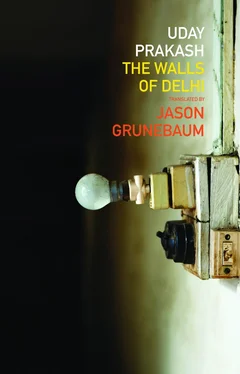‘What is your father’s name?’
‘BABOOJI! O, babuji! Could you please come into the living room for a moment!’ Bisnath said with a loud voice and a smile.
‘It’s just dumb luck that Amma-Babuji happened to come here yesterday. They’d made some pickle, and used that as an excuse to come by and see us! You should please ask my mother and father themselves their names.’
‘Please excuse me,’ Amita said, as her in-laws were about to enter. She then added in English, ‘We’re a traditional family.’ She got up and left the living room.
Trailing behind Nagendranath as he entered the room was his wife, Renukadevi. Noticing the tilak piety marks affixed to their foreheads, Srivastav couldn’t help but leaping from the couch and greeting them with a heartfelt namaskar. Then, words coated in honey, he asked, ‘May I please know your full names? It’s really just a bureaucratic formality, full names if you don’t mind.’
Nagendranath didn’t pause for a second: ‘My name is Kabadas.’ He reached inside his kurta and drew out a necklace. ‘I took a vow and took this necklace and since then the verse of Tulsidas has been my guide and protection, and that’s when I added ‘das’ to my name. And right here is my wife Putlidevi, Mohana’s mother.’ Renukadevi nodded her head in assent.
And thus, the enquiry was completed. Welfare Officer A.K. Srivastav’s investigation concluded that all charges levelled against Mohandas, son of Kabadas, resident of Purbanra district Anuppur, Madhya Pradesh, were groundless. For clarification, he attached the certificates furnished by Purbanra chief Chatradhari Tiwari and the secretary of the municipality, Shyamala Prasad, to the report — certificates given to Srivastav by Bisnath himself.
At the behest of Bisnath and Amita — aka Mohandas and Kasturi — Srivastavji spent the rest of the afternoon relaxing with them at home, followed by an evening of first beer, then whisky, which was the run up to a scrumptious evening meal of desi chicken; and when, at eleven, it was time to get into his Maruti Zen and say goodbye, he continually asked Amita, whom he kept calling ‘Kasturiji,’ if she might, at his behest, come to their house and talk to his wife Sarita about getting more involved in social services.
But in spite of his being drunk, he kept his eyes fixed on Amita’s midriff — in the dark of night, the flesh had grown magnificent and seeped deeply into his psyche.
(This occurred at the time when the director of the selection committee of the public service commission took millions in bribes and then installed thousands of his own government employees all over the state, and who went on the lam after a CBI raid; when suitcases full of banknotes arrived at the residences of top ministers under heavy security protection, while ordinary citizens were barred entry; when an inspector general in Haryana and a cabinet minister were arrested and charged with illegal activities with women, and murder; when the ‘supercop’ famous for killing underworld criminals in encounters turned out himself to be a hit man.
…at the time when, after making Hindi and Urdu the ‘national languages’ of the people of the subcontinent, individuals from powerful political organisations, claiming that they themselves were literary figures, formed committees for the establishment of anti-establishment Premchand, Neruda, Faiz, Nazrul-Nirala as the national writers of India…. at the time when an ill, debt-ridden tailor, with no means
left to support his family, poisoned his wife and two children to death, and was then caught trying to kill himself. He was imprisoned and charged under Indian Penal Code sections 302 and 309 for murder and attempted suicide.)
***
Mohandas had a breakdown after the report of the enquiry committee. Ghanshyam and Gopaldas met once more with the general manager A.K. Singh pleading with him for an additional enquiry, but he said that it’s not how things worked to open a second enquiry. He said that the most capable and trustworthy officer had conducted the enquiry, and he didn’t want to create any sense of doubt in him by ordering a repeat. Later it emerged that Bisnath and Amita had also begun to invite the general manager to their home to make sure he was well fed and had plenty to drink; his wife had also become active in ‘social work’ — and the kitty parties, where she would collect money for the next ladies’ soirée, and keep a little for herself.
A rumour also spread in the coal mines that Amita had seduced A.K. Singh; his car was often spotted outside the gate of A/11 Lenin Nagar, home of coal mine supervisor Mohandas. People also began whispering that Bisnath, too, got involved; it seems that Singh sahib not only enjoyed partying, food, and drink, but men, too.
Mohandas had a breakdown, and smashed into smithereens. He couldn’t eat or sleep, he worked absentmindedly. He was in a state of utter malaise, and all sorts of strange questions and doubts swirled through his mind. So, were all the people who had good jobs and held high positions and ran around in automobiles and caroused who they really claimed to be? The names people went by, was that who they really were? Or had they committed fraud and assumed the identity of others? Was anyone in Lenin Nagar authentic, with a real name, real father’s name, place of birth? Or was everyone like Bisnath, chameleon-like, with many identities, counterfeit? Then Mohandas began to ask himself who, after all, he himself was? Mohandas or Bisnath? And the BA he earned from M.G. Degree College: had that been solely for Bisnath’s benefit, too? Did it happen like this to everyone?
He looked high and low throughout the house for the old postcards sent to him from the government job office. He yelled and screamed at Kasturi when he couldn’t find them. He did end up coming across a few postcards from a few years back with his name and his address. In town, people saw him and either didn’t say anything, or told him he should approach some politician or high-ranking civil service officer about his case. But in his current state Mohandas was unable to do so. Even Pandit Chatradhari, head of Purbanra’s village panchayat, had issued a written certificate declaring that Bisnath from Purbanra was Mohandas; his son, Vijay Tiwari, was in cahoots with Bisnath. He was always stealing glances at Kasturi and, like a hunter, he lay in wait for the day when a broken Mohandas would come fall at his feet and beg for the job at his buffalo dairy.
Mohandas kept noticing that whenever a public water pump was approved by the local panchayat it’d be installed right outside the home of one of the more important people in the village. When teachers were hired, or slots opened up for female teachers or rural health workers, or grants became available for building houses under the Indira Awas program, or funds were released by the Grameen Development Department for digging wells or tilling land, when the Nehru Employment Program had openings in its program for the educated unemployed, those same people would be the ones to divvy up the spoils. Sharda and Devdas reported that the same kind of discrimination happened during lunchtime at school when they ladled out the gruel.
That night for the first time in years Mohandas went over to his childhood mate Biran Baiga’s house; they got some stiff mahua brew and made a pork curry. Gopaldas also came. The group of four or five began drinking at seven. They’d also got hold of a dholak and a pair of manjira. That day Mohandas had got paid by the Seth from Vindhyachal Handicrafts for the bamboo ware he’d made: twelve hundred rupees. Gopaldas also had a bulging wallet. Biran Baiga was hosting, but the money for the liquor and meat had come from Mohandas. The stuff that Biran’s wife and sister brewed was so strong, it’d burst into flames if you rubbed it against the wall.
Читать дальше










